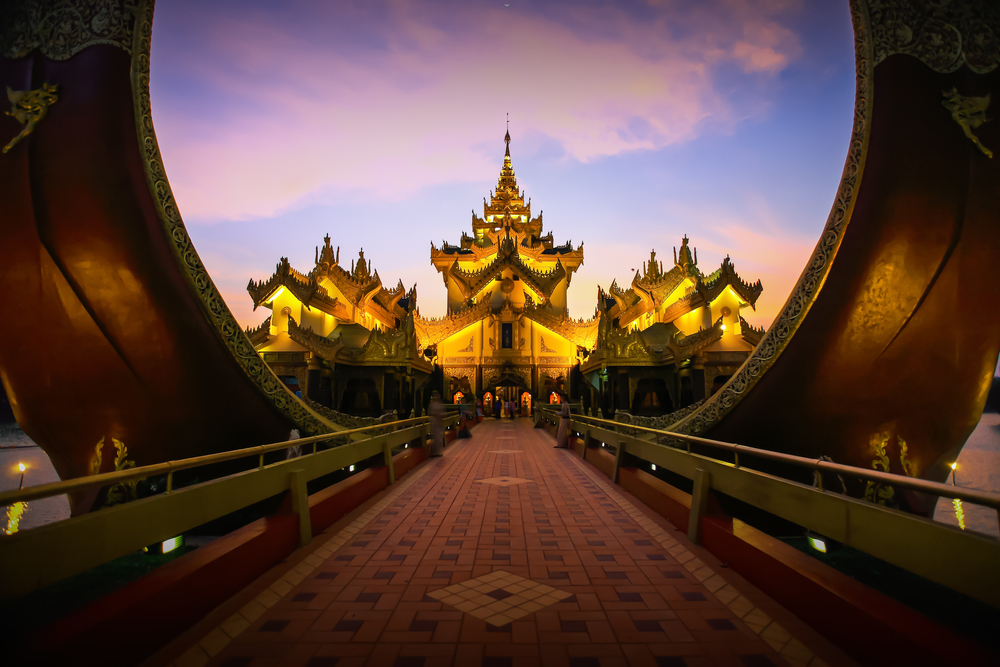Buddhist Nationalism Changes Course in Myanmar

Please note that we are not authorised to provide any investment advice. The content on this page is for information purposes only.
The upcoming general elections in Myanmar raise the question of religion’s role in democratisation processes. Previously Buddhism has been an important force in favour of democracy, but in the 2015 election campaign strong Buddhist forces are supporting the military-aligned Union Solidarity and Development Party (USDP). This is their democratic right, but it may hinder further political reforms and democratisation in Myanmar.
The upcoming general elections in Myanmar raise the question of religion’s role in democratisation processes. Previously Buddhism has been an important force in favour of democracy, but in the 2015 election campaign strong Buddhist forces are supporting the military-aligned Union Solidarity and Development Party (USDP). This is their democratic right, but it may hinder further political reforms and democratisation in Myanmar.
Buddhist nationalism has flourished since the introduction of political reforms in 2011. Leading Buddhist monks have formed the Organization for the Protection of Race and Religion, generally known by the abbreviation ‘MaBaTha’, which has the aim of promoting Buddhist interests. MaBaTha monks and nuns have been the driving force behind, among other things, four controversial laws designed to ‘protect race and religion’. The aim of these laws is to protect Buddhist interests, but some women’s rights groups and religious minorities see them as extremely discriminatory.
In the current election campaign, MaBaTha monks have lent their support to the governing party, the USDP, which represents the military regime. At the same time, MaBaTha has urged people not to vote for Aung San Suu Kyi’s party, the National League for Democracy, on the grounds that it is allegedly too Muslim-friendly. The generals have since the inception of the MaBaTha supported MaBaTha’s protectionist agenda. The election campaign is showing that Buddhism may legitimise authoritarian regimes if they are to be promoting Buddhist interests.
Demands for state protection of Buddhism have broad appeal in Buddhist countries and can mobilise political support. Traditionally the relationship between the state and religion has been characterised by mutual dependence, and there is a strong feeling that it is the state’s task to protect Buddhism. In Thailand, the king has to be a Buddhist. In addition, in both Sri Lanka and Myanmar it would be unthinkable to have a head of state who was not a Buddhist. Consequently, religious affiliation binds up political power.
The challenge is the place of religious minorities in states with a Buddhist identity. In several countries in the region, a pattern is developing where Buddhism legitimises the ruling political power, while ethnic and religious minorities undergo systematic exclusion. This political culture has been evident during this year’s election campaign in Myanmar, in which 88 candidates — many of whom were Muslims — were ineligible to stand for election. If Buddhist political players have contributed to the exclusion of religious minorities from the possibility of participating in democratic processes, Buddhism may be boosting authoritarian forces rather than contributing to democratisation.
While the Buddha preached radical ideas about salvation and equality, to claim that the Buddha was a democrat would be to read history backwards. Ancient Indian society had a hierarchical structure, and the Buddha did not challenge this structure directly. The prevailing concept is that of an ideal Buddhist king, expected to safeguard the monastic order through physical protection and material benefit, and prevent its moral decay. The expectation of the sangha in turn is to offer ideological legitimacy to the state.
Many of the claims made by the MaBaTha in the 2015 election campaign fit into this traditional pattern of state patronage of Buddhism, which finds resonance in the wider public. In fact, calls for the protection of Buddhism have shown themselves to be particularly well suited to electoral competition. The need to find a suitable ideology to rally for has paved the way for radical Buddhist nationalism in Myanmar.
Another key point in Buddhist political ideology is a formal divide between the state and the monastic order. In Myanmar (and Thailand), Buddhist monks are deprived of their political rights. The reason for this is in accordance with traditional Buddhist thinking, there should be a formal separation between the monks and political power. It means that the monks do not have the right to vote, form political parties, stand for election or sit in parliament. Myanmar’s half million monks potentially comprise a significant base of voters, and it is easy to believe that this rule was introduced by the generals in order to restrict the monks’ political activities.
Monastic disenfranchisement represents a political paradox. On the one hand, it points to the privileged status of Buddhism within the Myanmar state. On the other hand, it represents a particular violation of basic political rights of monks and nuns. However, this does not necessarily mean that monks feel deprived of their fundamental political rights or lack political influence. Many monks who fight for democracy think rather that their exclusion from formal political processes opens up new and more important opportunities for informal political influence, because they can preserve their religious authority precisely by not becoming ‘tarnished’ by party political activity.
Monks were central in mobilising opposition to the military junta in protests in 1988 and 2007. Many monks have also supported various student protests and signed calls for constitutional amendments. There are also strong Buddhist traditions of moral responsibility, justice, equality and willingness to work voluntarily for a common purpose. All these traditions are important for successful democratisation.
Buddhism may contribute to democratisation in Myanmar, but only if Buddhists make a stand for a new and inclusive Myanmar where ethnic and religious minorities receive protection and enjoy equal rights.
Are Myanmar’s monks hindering democratisation? is republished with permission from East Asia Forum




